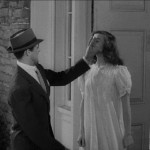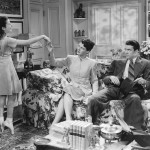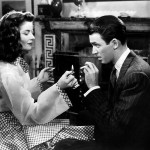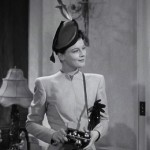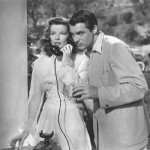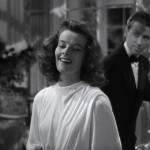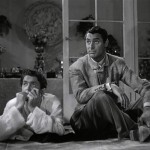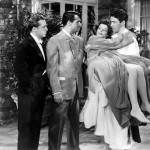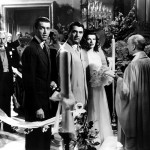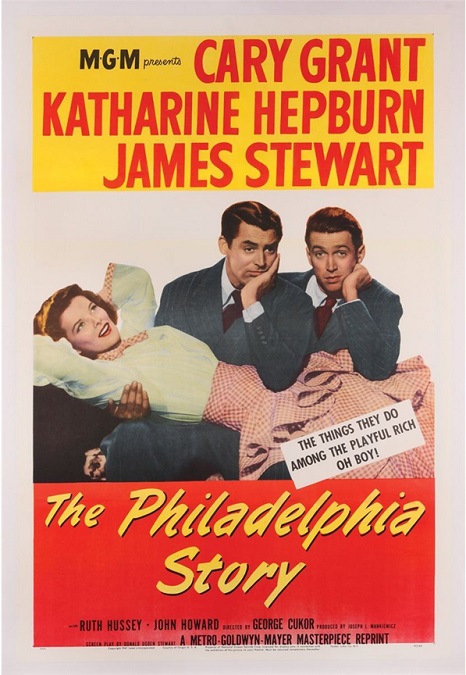
The Philadelphia Story – 1940
This was a screwball comedy done right, plain and simple. It starred Katherine Hepburn, Cary Grant, and James Stewart at the three leads. They each did a fantastic job, although if I had to pick one of the trio to be a weak link, it would have to be Stewart. Grant and Hepburn both have such strong and captivating personalities. They draw focus without even trying. But Stewart played his character as he played most of his characters in other films, quieter and softer-spoken. Next to Grant and Hepburn, he sometimes seemed to fade into the background.
The story was about a rich Philadelphia socialite named Tracy Lords, played by Hepburn, who was engaged to be married to a nouveau riche “man of the people”, George Kitteredge, played by John Howard. But the situation is complicated by a scheme hatched by her ex-husband, Dexter Haven, played by Grant. He is a wealthy playboy on the same social level as Tracy. He, along with sleazy Spy Magazine publisher, Sidney Kidd, have the means to blackmail Tracy’s family, thus tarnishing the family name.
Kidd wants an article covering the impending wedding. Dexter seems to want something else. The two enlist the help of Mike Connor, a talented author who is reduced to writing for the disreputable magazine in order to pay the bills, played by Stewart, and a photographer who is secretly in love with him, Liz Imbrie, wonderfully played by Ruth Hussey.
So there’s the set-up and hijinks ensues. The script and the dialogue is clever and witty. The characters are real and entertaining. They each have their flaws and their endearing qualities as well, making them complete characters. The cast of supporting actors was perfect, especially Ruth Hussey, who stood out to me as a great actress with a wonderful sense of comedic timing. In fact Hussey was nominated for Best Supporting Actress, though she did not win.
In all, the film was nominated for 6 awards, though it only won two. Stewart took home an Oscar for Best Actor, as did film’s screenwriter Donald Ogden Stewart. In my research, I learned that Stewart didn’t expect to win the Award and was not planning on going to the Award Ceremony. However, he was contacted and strongly advised to attend.
The film was delightful to watch and easy to enjoy. It had something that many great films from that era of movie-making had. It had the flavor of high-society. People have always loved seeing films about wealth and style. The Philadelphia Story had that in spades. In the words of Stewart’s character, Mike Connor, “The prettiest sight in this fine pretty world is the privileged class enjoying its privileges.” Truer words were never spoken.
One of the things that make this movie such fun to watch is the quick-witted banter between the characters. The actors spouted their tricky dialogue with what seemed like ease. But it was the back-and-forth quips and bickering between Hepburn and Grant that really took center stage in my book. The two of them had a natural on-screen chemistry that was captivating.
Another fun thing about the dialogue was the little snide background comments from characters who were not engaged in the main conversations taking place. For example, Tracy and Dexter would be talking in a room full of people, but Liz would throw in a quick little snapper, playing off what they were saying. It was well done and kept the audience on its toes. It also had the benefit of reminding the audience that there were other people in the scene.
Now, though this is a screwball comedy, there were a few moments of real heart that seamlessly fit into the fabric of the film. One of the several reasons why Tracy and Dexter had been divorced was that Tracy was such a blue-blood with her nose in the air, such a spoiled rich girl, that she had no tolerance for imperfections in anybody, least of all herself. Nobody could ever live up to her standards.
But as all comedies do, it had a happy ending. Everybody ended up with the right people, making all the funny zaniness worth it. The movie had a feel-good ending and made me smile. So well done.
